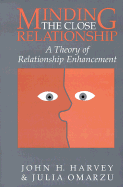Book contents
- Frontmatter
- Contents
- Preface and Acknowledgments
- 1 Introduction to the Minding Concept
- 2 Minding: Definition and Components
- 3 Knowing and Being Known by One's Partner
- 4 Attributions in Close Relationships
- 5 Acceptance, Respect, Reciprocity, and Continuity
- 6 Beginnings and Endings
- 7 Minding in the Close Relationship Literature
- 8 Minding and Other Major Concepts of Closeness
- 9 Evidence about Minding in Close Relationships
- 10 An International Perspective on Minding
- 11 Minding in Couples Therapy and Counseling
- 12 Limitations and Future Directions
- References
- Index
10 - An International Perspective on Minding
Published online by Cambridge University Press: 14 September 2009
- Frontmatter
- Contents
- Preface and Acknowledgments
- 1 Introduction to the Minding Concept
- 2 Minding: Definition and Components
- 3 Knowing and Being Known by One's Partner
- 4 Attributions in Close Relationships
- 5 Acceptance, Respect, Reciprocity, and Continuity
- 6 Beginnings and Endings
- 7 Minding in the Close Relationship Literature
- 8 Minding and Other Major Concepts of Closeness
- 9 Evidence about Minding in Close Relationships
- 10 An International Perspective on Minding
- 11 Minding in Couples Therapy and Counseling
- 12 Limitations and Future Directions
- References
- Index
Summary
This chapter presents case study evidence from interviews with couples and single persons conducted by the first author while in Romania working as a Fulbright Research Scholar in the spring of 1998. As is true for the evidence presented in the previous chapter, this research was designed to be illustrative rather than conclusive regarding minding ideas from an international standpoint. Psychologists frequently note the need for more cross-cultural research on psychological phenomena. This work was carried out in part to address that need as it applies to close relationship functioning.
While this evidence is not intended to represent relationship functioning for the whole of such relationships in a country of more than 20 million, it is intended to provide some insights on how social context affects relationships. As Kelley et al. (1983) argued in their theoretical analysis of the dynamics of close relationships, the social environment in which a close relationship occurs may play a vital role in how the relationship functions. That point is certainly true in Romania and some other “transitional” countries in Eastern Europe in the late 1990s. Of all the environmental forces affecting relationships in Romania at this time, the eroding economy is having a major impact on how people function, including their efforts to achieve closeness and have families.
- Type
- Chapter
- Information
- Minding the Close RelationshipA Theory of Relationship Enhancement, pp. 168 - 181Publisher: Cambridge University PressPrint publication year: 1999



